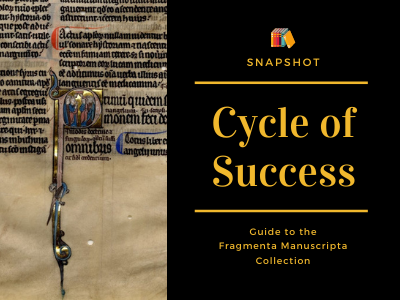In Fall 2020, Dr. Brittany Rancour worked with Special Collections to create a digital guide to the Fragmenta Manuscripta collection through a partnership with the Department of Visual Studies. The Fragmenta Manuscripta Collection is a collection of manuscript fragments, most of them from the twelfth to the fifteenth centuries, but with materials extending as far back as the eighth century and as recently as the seventeenth century. Dr. Rancour’s project involved updating and expanding the finding aid to provide in-depth descriptions of over 200 manuscript fragments, work that was first started by Nicole Songstad, a graduate research assistant in Special Collections.
Dr. Rancour, now a Visiting Assistant Professor of Humanities at Dixie State University, came to Mizzou as a PhD student in medieval art history and was drawn to Special Collections, specifically because of the assortment of medieval manuscripts. “When the librarians wanted to develop an on-line learning experience for the collection, I jumped at the opportunity to work with the fragments,” says Dr. Rancour.
The fragments are parts of completed manuscripts that include bibles, books of hours, legal texts, and poetry. Over the centuries, people tended to cut fragments from the the original bindings as collectors valued parts of the texts rather than the entire product. The history of the collection begins with John Bagford, an English book collector around the turn of the eighteenth century. Bagford had a collection of manuscript fragments and had ambitions to write a history of the development of printing from handwritten manuscripts to the invention of the moveable type. In an essay dated to 1707, Bagford wrote that the collection was, “perhaps the first of that kind that ever was done in any part of Europe.” You can learn more about the collection here.
Before Dr. Rancour’s work on this project, there was no finding aid at all. “It was all digitized and available on Digital Scriptorium, but it was difficult to find groups of materials. This finding aid has helped staff and patrons tremendously in locating specific items according to various themes – poetry, or sermons, for example. In fact, I used it just last week to find materials for a class,” says Kelli Hansen, Head of Special Collections.
Partnerships between the libraries and different departments on campus open up various opportunities for learning and research. Asked for one piece of advice for those interested in working with the library, Dr. Rancour said, “ask a Special Collections librarian what types of objects are in their collection. It is an excellent collection and has so much to offer to students and others interested in history.”
Cycle of Success is the idea that libraries, faculty, and students are linked; for one to truly succeed, we must all succeed. The path to success is formed by the connections between University of Missouri Libraries and faculty members, between faculty members and students, and between students and the libraries that serve them. More than just success, this is also a connection of mutual respect, support, and commitment to forward-thinking research.
If you would like to submit your own success story about how the libraries have helped your research and/or work, please use the Cycle of Success form.
